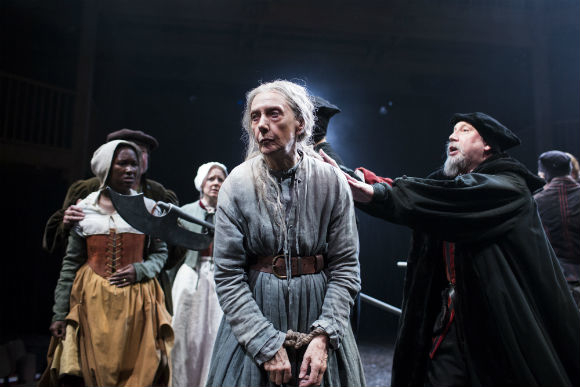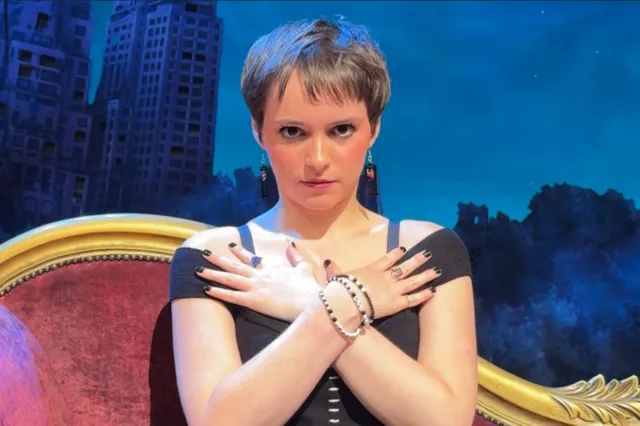Michael Coveney: Bill Bryden wraps up the Cottesloe, Eileen Atkins returns to Stratford
A new book reflects on a bygone era of the National, while ”Evita” bows out in the West End and Eileen Atkins defies her 80 years

© National Theatre
Shortly after it was announced that the National's Cottesloe auditorium was to be renamed the Dorfman in honour of a major NT sponsor, the actor Jack Shepherd rang the director Bill Bryden and said, "I think we're being written out of history; in time we'll be less than a footnote."
Shepherd was a regular in the macho, hard-drinking, tough-playing Bill Bryden company that provided such a distinctive flavour to the Peter Hall years at the National, from the world premiere of David Mamet's Glengarry Glen Ross and the early Eugene O'Neill sea plays, to Tony Harrison's unforgettable version of The Mysteries (Brian Glover's God in a flat cap on a fork lift truck), Keith Dewhurst's adaptation of Lark Rise to Candleford, and Michael Herr's coruscating Vietnam War reportage play, Dispatches.
These and other highlights are providing the footnote – if that's the fate of the Cottesloe – in a sumptuously produced new picture book Lives in the Theatre (Oberon, £19.99), featuring words by Bryden, photographs by Nobby Clark. It's a wonderfully evocative collection of mostly black and white pictures punctuated by Bryden's woozily swaggering prose, many portraits, with a constant suggestion that Bryden's shows were team sports as much as anything else, with semi-lit technical rehearsals in a haze of cigarette smoke, actors in overalls and braces, sets made of wood, steel, gantries, ropes and pulleys.
But it's not just the Cottesloe. We follow Bryden's forays, Clark still clicking away at his elbow, into the Royal Opera House, the West End (Helen Mirren and John Hurt in a superb version of Turgenev's A Month in the Country), and television (actors, led by David Hayman on a donkey, careering down Sauchiehall Street in Glasgow in The Holy City for BBC Scotland one Easter Day).
Two of my favourite Bryden productions, and two of his biggest, were The Ship and The Big Picnic in the 1990s, both staged in the old Harland and Woolf ship-building shed in Govan, where Billy Connolly once worked as a welder. In this "industrial cathedral" they, well, built a ship in the first play and memorialised the Angel of Mons legend at the Battle of the Somme in the second; there are not many words (not enough perhaps) about these great shows, both designed by William Dudley, but Clark's pictures tell the story of their scale, ambition and sheer bloody-minded magnificence.
Evita closes and Dame Eileen hits back at RSC
It was a great pleasure to return to a fairly full and stylishly refurbished Dominion Theatre this week, if only to catch one of the last performances of Evita, a serviceable revival rather than a great one (certainly not in the same league as either Hal Prince's Brechtian original with Elaine Paige or Michael Grandage's Latin American, beautifully re-orchestrated version with Elena Roger). Marti Pellow's Che was fuzzy both vocally and dramatically – the audience seemed puzzled as to what exactly he was doing all night – and the chorus work was a bit ragged round the edges, certainly suggesting that levels of production maintenance weren't all that "high flying adored."
What most impressed me was how innovative and indeed "difficult" a lot of the score remains in its jangling rhythms, switches of key and time signatures, its barbarity offset by one or two parodistic lyrical numbers and the ever beautiful "Another Suitcase in Another Hall" (you could hardly blame Madonna for swiping it from the mistress, however senselessly, in the movie). The Dominion mistress, Sarah McNicholas, is excellent, but the show rightly belongs to Madalena Alberto in the title role, a performance of real vocal power and variation, and a fine acting display, too, and looking more like Eva Peron in the flesh than any of her predecessors.
I dare say she'll be cropping up in Wicked soon, but I do fear "what next?" for our leading musical ladies; sounds like Imelda Staunton's cornered another iconic role, though, as Mama Rose in Gypsy at Chichester, even without the glamour of Ethel Merman or Angela Lansbury.
Judi Dench and Maggie Smith both reach 80 years of age this December, but another remarkable dame, their great friend Eileen Atkins, has beaten them to it already. It was hard to credit this last night at the opening of The Witch of Edmonton in Stratford-upon-Avon. Her vocal power and physical presence are undiminished by age, and the poor old girl even had to endure being pushed about for being a social outcast.
By way of a short supplementary review I'd add that she reminded us, too, that she's a north London working class girl from Tottenham. The accent is totally authentic on a stage full of variable topographical locutions, suggesting that she alone is the one person who genuinely belongs to Edmonton while the others make of her a sideshow and a mockery in her own back yard. So much for multi-culturalism.

© RSC












